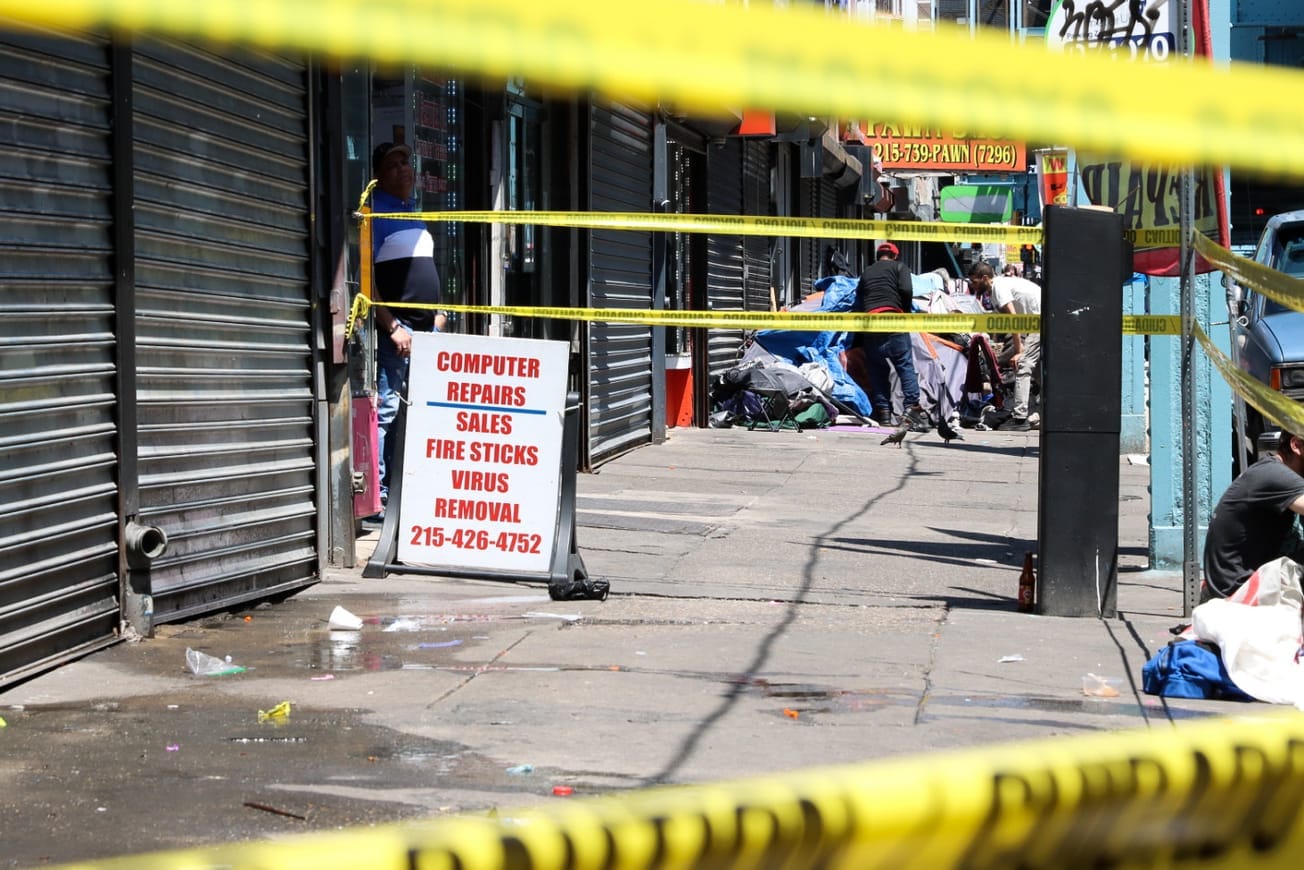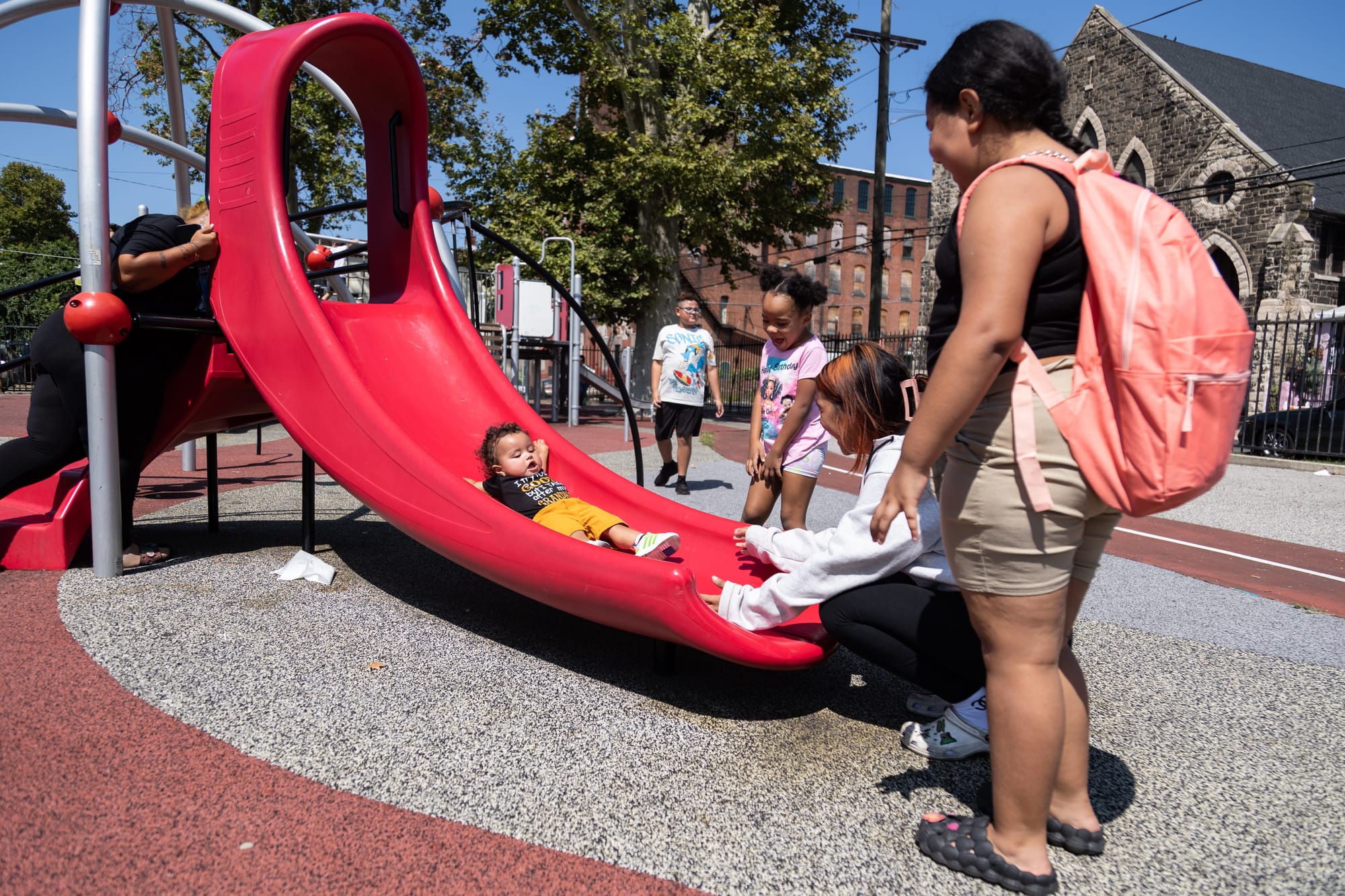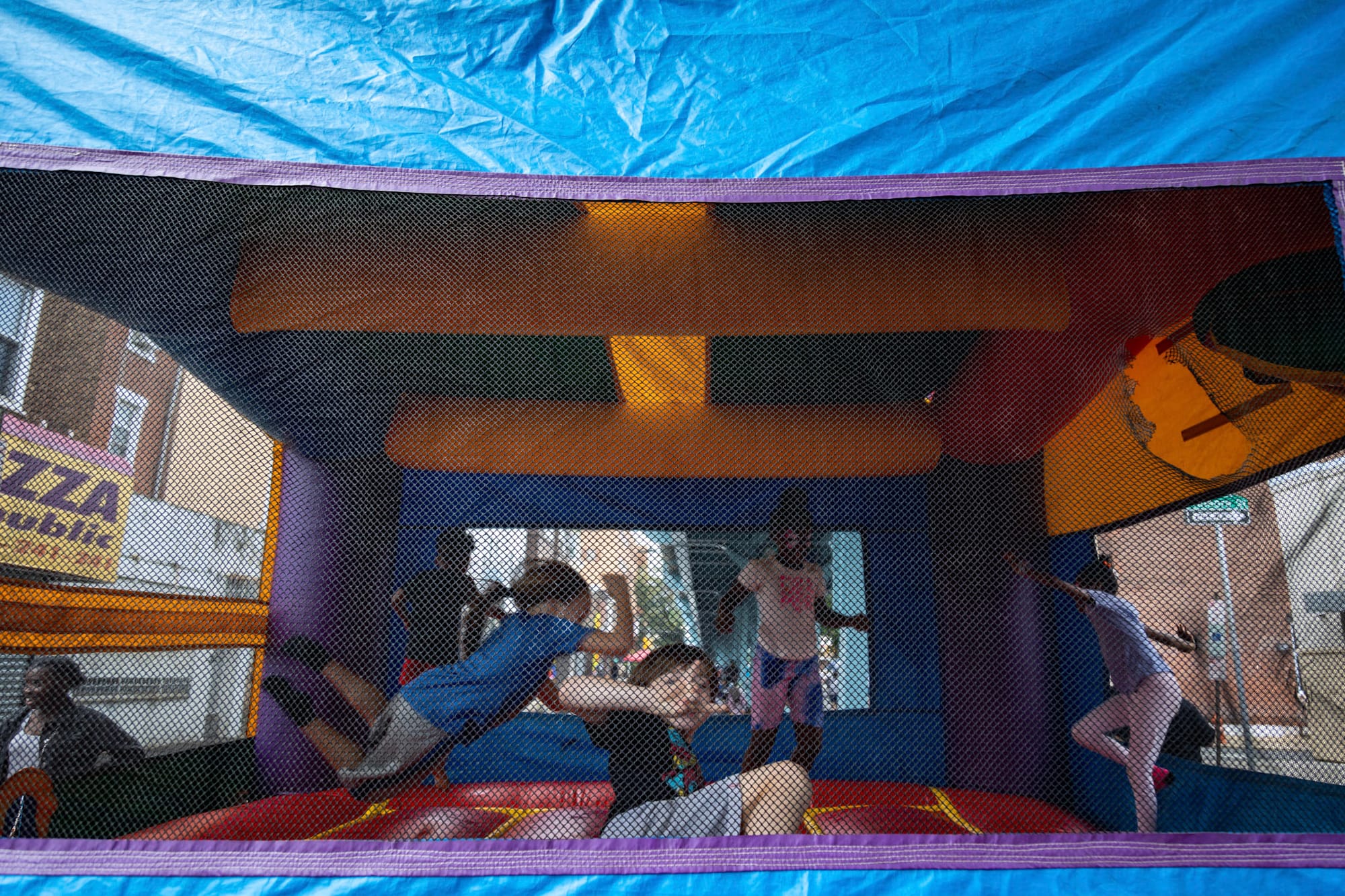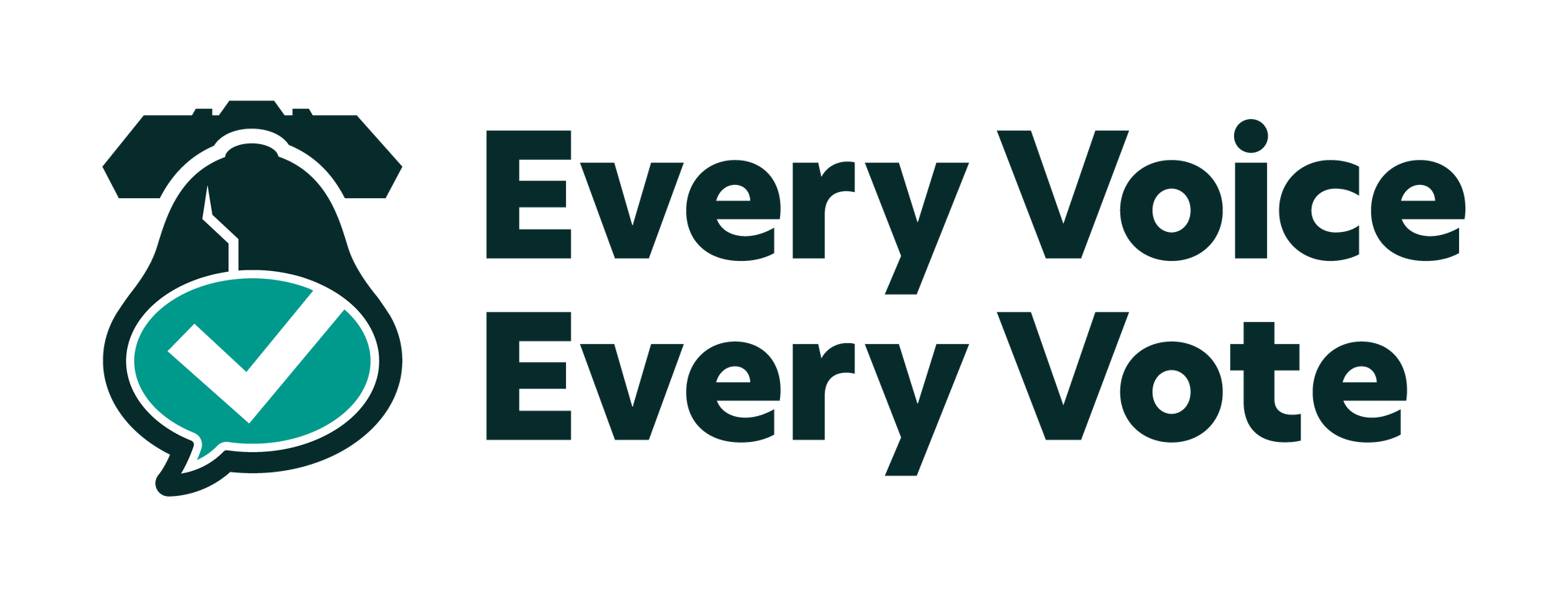Opioid settlement spending faces growing scrutiny as Pennsylvania awaits millions more
Counties battle uncertainty over funding rules while advocates and families push for an increased say in opioid settlement spending decisions.
Community leaders and residents believe funding environmental conditions that will improve the lives of families and children is a step toward repairing the harms the open-air drug market has caused the neighborhood.

Since Jessica moved into her Kensington home five years ago, she hasn’t been able to open her windows. The sills are rotting from water damage and opening them poses a hazard.
“The front windows have to be screwed shut, because they'll literally fall in on you,” said Jessica, who asked to use a pseudonym for privacy reasons. “It would be really nice on this nice day to just open the windows and have a breeze, instead of having 10 fans going and it being muggy in here.”
But in September, contractors replaced the windows at no cost. The city covered the expense using funds from opioid settlement dollars awarded to Philadelphia following a 2021 lawsuit against drug manufacturers and distributors for their role in the opioid crisis.
In 2023, Philadelphia received $20 million in settlement funds from Johnson & Johnson, with $7.5 million allocated for Kensington’s parks, schools, home repairs, rent and mortgage relief, and small business support.

Community leaders and residents believe funding environmental conditions that will improve the lives of families and children is a step toward repairing the harm the open-air drug market has caused the neighborhood.
But on June 20, the Pennsylvania Opioid Addiction and Abatement Trust – an independent body that oversees how local governments use opioid settlement dollars – voted that the Kensington spending does not comply with national guidelines.
Philadelphia is appealing the decision, with the trust’s dispute resolution board expected to vote on Thursday. If the city loses the appeal, they can take the fight to Commonwealth Court. If the trust’s ruling stands, it could mean that next year, the trust could reduce or withhold city settlement money.
“This board is very cognizant of the problems besetting, particularly, the Kensington area,” said trust chair Thomas Van Kirk in June. “However, we believe that the programs that were outlined in the use of opioid money is inappropriate, it does not comply with exhibit E.”
Exhibit E is a list of approved spending categories, such as opioid overdose reversal medications, medications for opioid use disorder, addiction treatment, and recovery services.
The trust approved Philly’s spending programs and services that fall within these categories, like the city’s Opioid Response Unit and nonprofits that offer housing and addiction services. But it also approved funding for a wide range of activities focused on resilience and community healing, such as youth programming like Yoga 4 Philly, Poetry at the Park, and Fab Youth Philly.
Jessica’s home is one of the 400 in Kensington selected for repairs with the funds. About another 250 families will receive rent or mortgage assistance, distributed by the New Kensington Development Corporation (NKCDC), according to Executive Director Bill McKinney.
“The impact has been very real,” said McKinney, who, along with other community leaders and residents, believes the settlement money should benefit both those living with addiction and those living around it.
Resident Darlene Burton, who has lived in Kensington for 28 years, is getting a roof repair she couldn’t afford otherwise. Her roof leaks when it storms.
“We need to uplift and bring our community to a place where we can deal with coming outside every day and seeing people slumped over,” Burton said. “We’re affected too, and they need to know that. We're truly traumatized by what we see on a daily basis. Help us. Invest in us.”

Awilda Balbuena, principal of Gloria Casarez Elementary School, said many of her families “[hold] their kids hostage in their homes just to keep them safe” over the summer. During the school year, kids mostly go from home to school and back.
Along with gun violence, Balbuena and other principals expressed concern about human defecation, used needles on the sidewalks, and students “walking over people that they think are dead in the street” due to drug use.
Balbuena and Diana Garcia, principal of Willard Elementary School, said they are constantly fighting for their students' basic human rights.
“Thirty minutes a day in a clean playground — that should be something that every child in the city can do,” Garcia said.
Balbuena asked, “Why are we fighting for basic, fundamental things for children?”
Gloria Casarez, Willard, and four other Kensington schools are using the settlement funds for career counselors, climate specialists, new playgrounds, fencing, uniforms, crossing guards, a family food freezer, and more, according to their principals. Some schools, like Mastbaum High School, are addressing drops in enrollment impacted by the opioid crisis and are working to build enrollment back up.
“There are families that sending their child to the epicenter of the opioid epidemic is prohibitive, no matter how great the programs are,” said David Lon, principal of Mastbaum, a career and technical education school.
Lon said nearby families might not even know about Mastbaum’s career and technical programs, like carpentry and electrical transmission. So, they and other schools are using settlement money for signage to advertise to people walking by. Mastbaum is also renovating its old fitness center, which currently has broken gym equipment.
“What does a student walk through to arrive at Mastbaum High School? They walk through human tragedy,” Lon said. “And what they deserve walking into Mastbaum High School? They deserve to see some beautiful spaces.”
For these school leaders, the funding is just a drop in the bucket in an underfunded school district within one of the city’s most financially challenged neighborhoods, forcing them to spend on items that don’t require ongoing funding.
Willard is building its first playground and purchasing new fencing made from material resistant to bullets and high enough to deter trespassing and encampments. Last year, bullets entered an empty Willard classroom.
Willard ranks third in the country for schools with the highest number of shootings nearby, according to an analysis by the Trace. Four other Kensington schools are in the top ten of the list, too.
“I think this money is being well used because we are helping students feel safe, reminding them that they are kids, that they're special, and they deserve to have a little playground in the schoolyard ... because their neighborhood didn't provide that for them,” Garcia said.

Gloria Casarez is expanding its playground, getting astroturf instead of cement, and planting trees.
At least, when families and students see a new fence, “ that'll help relieve some burdens and some trauma, that will allow them to learn better,” Garcia said.
But these fixes won’t erase what kids have experienced living in an open-air drug market during the opioid epidemic, Balbuena said.
“It's not going to erase the scary walks to school,” said Balbuena.” “... This is a band-aid to an open chest wound.”
Two state senators who sit on the trust recently toured Kensington. Both Sen. Gregory Rothman, who represents three counties near Harrisburg, and Sen. Christine Tartaglione, who represents Philadelphia, including Kensington, voted the Kensington spending noncompliant.
The PA Opioid Addiction and Abatement Trust, a 13-member board made up of state lawmakers, county health commissioners, mayoral staff, and addiction treatment administrators, has more elected politicians than similar oversight boards in other states, according to a KFF Health News and Johns Hopkins analysis.
”Why would we expect them to have enough expertise?” said McKinney of the makeup.
Nationally, similar councils are one-fifth public health and human services representatives, with the rest split among elected officials, law enforcement, and medical and social service providers.
During the Sept. 23 tour in Kensington, Rothman said that before his visit, he did not realize children lived in the neighborhood.
Community leaders, researchers, and residents argue that creating safe spaces for children to learn and play helps prevent opioid misuse. Positive spaces and relationships serve as protective factors, according to Sara Whaley, a researcher at the Johns Hopkins Bloomberg School of Public Health.
For example, having a parent with substance use disorder is one of the biggest risk factors for children, but exposure to a stable, trusting adult and a safe environment can help decrease that risk, Whaley said. “Just a stable environment can really help mitigate those risk factors,” she said. “And schools play a huge role in that.”
Waley’s team released “Principles for the Use of Funds from the Opioid Litigation” in 2021, recommending investments in youth programming, harm reduction, and housing assistance.
In other states, settlement funds have been used for all sorts of things, including police cars and jail equipment.
McKinney said the trust’s vote oversimplifies prevention by not connecting it to environmental factors like education, housing stability, and parks and recreation. He believes helping families stay in their homes is critical to long-term, cost-efficient solutions to the crisis.
“When … you gotta hit that corner now because you got to make sure that your mom can stay in her house, that opens up a whole other can of worms,” McKinney said. “Those that are actually here understand that. Somebody from the middle of Pennsylvania who's never been to Kensington doesn't know what's going on and shouldn't have any input in what we do out here.”
Burton said activating public parks is another way to “repair and uplift the community.”
Five parks received $100,000 each out of the $7.5 million total for Kensington. Erin Farrell, a resident who works for the local nonprofit Impact Services, helped the parks figure out how to spend the money, which mostly went toward kids through capital improvements, programming, and events. Some residents lack access to cars, so she said having fun, free, walkable events is essential. She also said she feels Kensington’s kids are often left out of the conversation.
“People forget ... how traumatized they are from living here, how their lives are a struggle,” Farrell said. “The first thing you teach your kids when they learn how to walk is ... ‘Don't step on needles.’”

During a tour of Scanlon recreation, Farrell pointed to a new fence around the public pool, bought with settlement dollars. It’s now fully functioning and high enough to prevent trespassing. She said they used to find used needles at the pool’s bottom.
For the parks, each spending plan was first influenced by resident surveys to gather input and then voted on by residents.
“The whole point of this money ... was meant to be community led,” Farrell said. Residents felt empowered by the process. “They all feel like they're able to be responsible for choices that normally are completely outside of their control... we're tired in this neighborhood of everyone coming in and telling us what we should want, what we should do, how we should be.”
At Scanlon, over half of the people surveyed requested a curling club at the park’s ice rink. So Scanlon bought the gear, and the club held its first meeting of the season on Sept. 30.
“Imagine, we could have an Olympic champion come right out of here,” Farrell said.
Future funding for parks, schools, and housing might be hanging on the results of Thursday’s appeal. Sen. Tartaglione said she will reconsider her decision during the appeal hearing.
“If they can make their argument that it fits under Exhibit E, we’ll do it,” Tartaglione said in September. If they don’t, they have the opportunity to go to Commonwealth Court.”
If the city wins the appeal, McKinney said it will be a small relief after a history of administrations ignoring Kensington’s problems. He said this can be a step towards combating gentrification in the neighborhood.
“That can't be how this story ends,” McKinney said. “This is one of those opportunities to actually stabilize some of these spaces.”

Have any questions, comments, or concerns about this story? Send an email to editors@kensingtonvoice.com.
Free accountability journalism, community news, & local resources delivered weekly to your inbox.